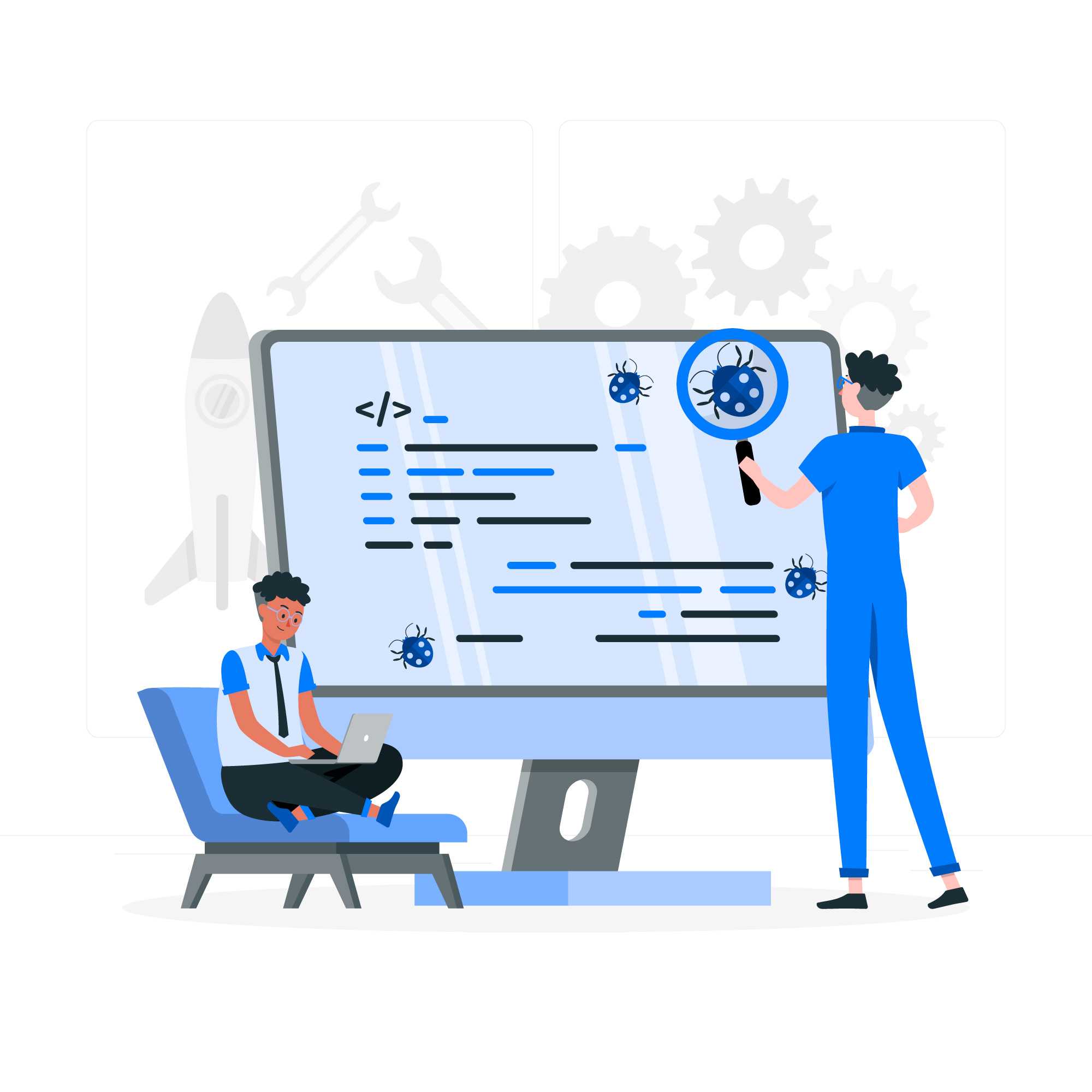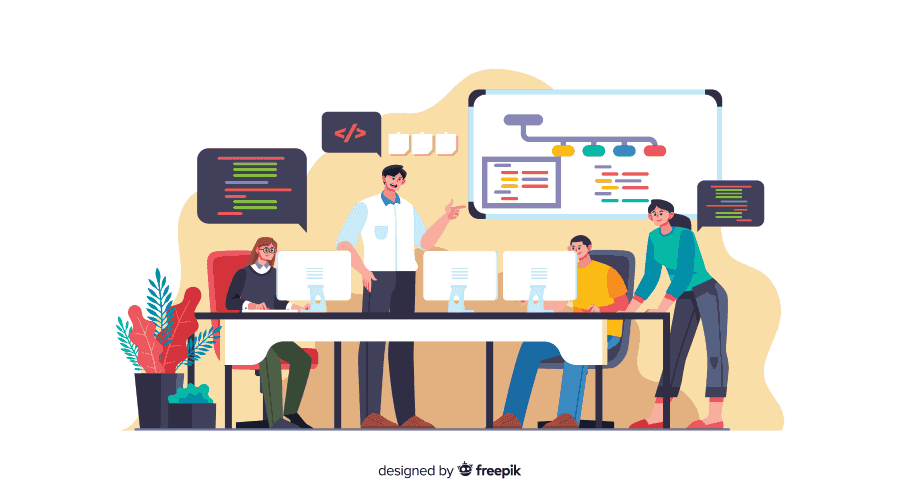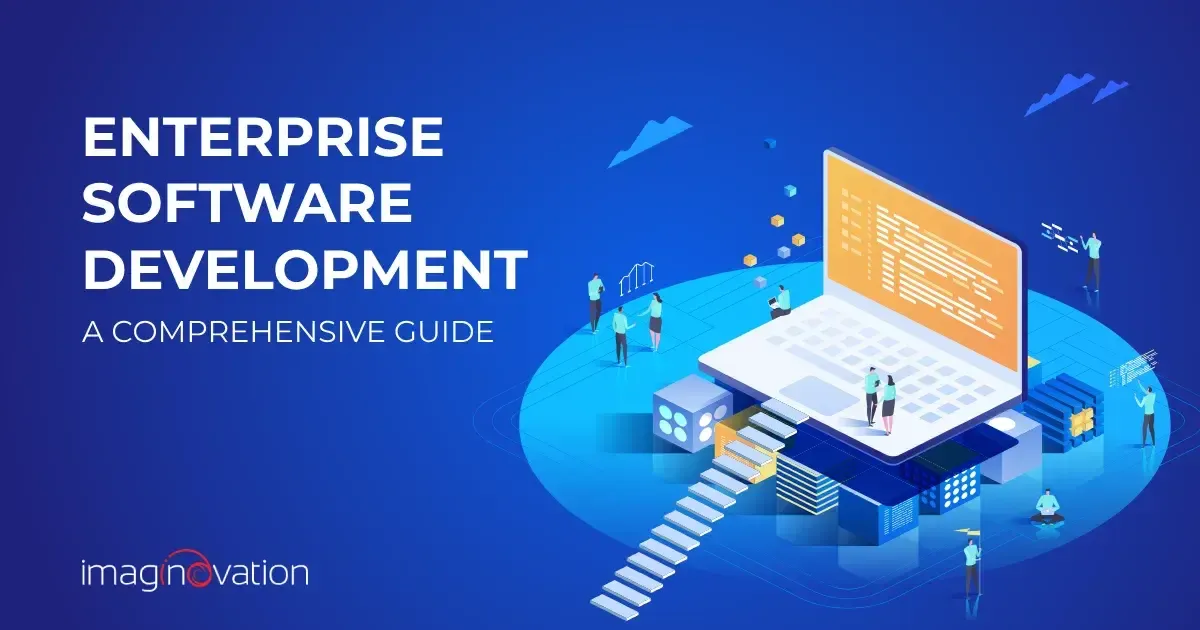To estimate the cost of building a website or an app, use our app cost calculator tool.
Every thriving business relies on the expertise of talented professionals. When it comes to tackling tech challenges, many business leaders turn to hiring a software development team for fast and reliable solutions. But here’s the catch—the demand for tech talent often outpaces the supply.
In 2024, a study by Robert Half revealed that 95% of technology leaders face challenges in finding skilled talent (source). This growing gap highlights why having a dedicated software development team has become essential.
With the right team of skilled engineers, you get full control over your project and better results. Plus, these teams are built to handle shifting priorities and changing requirements with ease.
In this guide, we’ll dive into everything you need to know about the dedicated development team model. Let’s get started!
What is the Dedicated Software Development Team Model?
Starting a new software project? One of the first things to figure out is how to build the right development team.
Maybe you don’t have enough in-house talent, or your current team is already stretched thin. That’s where outsourcing comes in—it’s a smart way to hire a software development team to handle your project without overloading your staff.
There are a few popular outsourcing models to choose from, like staff augmentation, project-based outsourcing, and dedicated software development teams. But how do you decide which one works best for your needs? Let’s break it down.
What is a Dedicated Software Development Team?
A dedicated software development team comprises professionals, including project managers, designers, developers, and quality assurance testers, who are holistically involved with your project.
They work as an extension of your in-house team and seamlessly work as an integral part of your organization. The model offers unmatched expertise, a high level of engagement, accelerated time-to-market, flexibility, and scalability.
Key benefits
- Unmatched expertise: Gain access to a team of professionals who are up-to-date on the latest technologies, frameworks, and industry best practices.
- Flexibility and scalability: Easily scale your team up or down based on your project’s changing demands.
- Cost-effectiveness: Only pay for the resources you need, helping you save on operational costs.
What is Staff Augmentation?
Staff augmentation is a collaboration model that helps businesses enhance their in-house teams by hiring skilled professionals for specific projects. The model scales the workforce and helps with direct control and close collaboration. Thus, one can handle increased workloads without extensive hiring or long-term commitments.
Key benefits
- Direct control: You can work without staffed experts while having complete control over the development process.
- Cost-efficiency: You can reduce additional costs, such as taxes, fees, accounting, vacation, and sick days.
- Selecting specific skills: Staff augmentation allows you to choose team members with particular skills (such as a Python developer or a data scientist) for your project.
What is Project-based Outsourcing?
Project-based outsourcing is a model where an outsourcing company takes full responsibility for your project’s development, from start to finish. They’ll assemble a dedicated team, manage every stage of the process, and handle deployment—leaving you free to focus on your business priorities.
Key benefits
- Access to Top Talent: Bring in experts with the right skills to handle your project’s specific needs while you focus on your core responsibilities.
- Faster Time to Market: This model often speeds up timelines, ensuring quicker delivery and meeting deadlines for time-sensitive launches.
- High-Quality Results: Outsourcing teams deliver polished, professional outcomes by applying fresh perspectives and proven industry practices.
Also Read: Making Software Fast: A Look at Removing Bottlenecks in Software Design
Choosing the Most Suitable Model for Your Project
Picking the right collaboration model depends on evaluating a few key factors. Each model offers unique benefits, so it’s important to align your choice with your project’s specific needs.
Key Factors to Consider
- In-House Expertise: If your in-house team doesn’t have the necessary skills, outsourcing can bridge the gap effectively.
- Project Duration: For long-term projects with evolving requirements, a dedicated team is often the best fit. For shorter projects, staff augmentation provides a quick and flexible solution.
- Time-to-Market: Need to get started quickly? Staff augmentation can help you hit the ground running. If your project needs to be built from scratch, a dedicated team ensures thorough and consistent development.
- Budget Constraints: Tight on budget? Outsourcing models like staff augmentation or dedicated teams help you control costs by paying only for the resources you need.
Bottomline: The dedicated team model is ideal for long-term, scalable projects where consistent collaboration and expertise are key. By carefully evaluating your project’s needs and these factors, you can confidently choose the model that suits you best.
Also Read: IT Staff Augmentation Vs. Outsourcing: What's The Difference
Key Roles in a Dedicated Software Development Team
A dedicated software development team is made up of professionals with specialized skills. Each role is critical in ensuring the success of your project, from planning and execution to delivery and maintenance. Let’s break down each role and its value:
Project Manager (PM)
The project manager acts as the backbone of the team, ensuring the smooth execution of the project. They:
- Plan and organize: Develop a detailed project roadmap, outlining timelines, milestones, and deliverables.
- Define requirements: Work with stakeholders to clarify project goals and objectives.
- Monitor progress: Keep the project on track by coordinating between team members and addressing any roadblocks.
- Communicate effectively: Serve as the primary point of contact for stakeholders, providing updates and gathering feedback.
- Manage resources: Optimize team resources to avoid delays or bottlenecks while staying within the budget.
Why it matters: A skilled PM ensures that all moving parts of the project align seamlessly, delivering results on time and within budget.
Business Analyst (BA)
Business analysts bridge the gap between your business goals and the technical execution. They:
- Gather requirements: Collaborate with stakeholders to understand the project’s vision and goals.
- Analyze data: Dive into data to identify trends, challenges, and opportunities that will shape the project.
- Translate requirements: Convert business needs into clear technical instructions for the development team.
- Create documentation: Develop use cases, workflows, and mockups to guide developers.
- Provide ongoing insights: Offer suggestions throughout the project to align development with business objectives.
Why it matters: Without a BA, there’s a risk of miscommunication or misalignment between what stakeholders want and what developers build.
UI/UX Designer
UI/UX designers focus on creating a product that is visually appealing and user-friendly. They:
- Conduct user research: Understand the target audience by analyzing their needs, preferences, and behaviors.
- Design wireframes and prototypes: Create visual blueprints to demonstrate how the product will look and function.
- Focus on user experience: Ensure the design prioritizes ease of use, accessibility, and intuitive navigation.
- Collaborate with developers: Work closely with the development team to translate designs into functional interfaces.
Why it matters: A great design not only attracts users but keeps them engaged, directly influencing the product’s success.
Software Developer (Frontend, Backend, Full Stack)
-
Frontend Developers: They handle the user-facing side of the product, focusing on:
- Creating responsive and attractive designs that align with user needs.
- Implementing functionality that ensures a smooth and interactive user experience.
- Optimizing performance to improve retention and conversion rates.
-
Backend Developers: They manage the behind-the-scenes functionality, including:
- Designing server-side architecture to support data storage and retrieval.
- Building APIs for communication between the frontend and backend systems.
- Ensuring application security and scalability.
-
Full Stack Developers: They combine frontend and backend expertise, allowing them to:
- Build end-to-end solutions for web and mobile apps.
- Troubleshoot issues across all layers of development.
- Offer a holistic approach to project development.
Why it matters: A balanced mix of these developers ensures your product functions perfectly inside and out.

Quality Assurance (QA) Engineer
QA engineers focus on maintaining the highest quality standards. They:
- Create testing strategies: Design manual and automated testing plans to identify potential issues.
- Find and fix bugs: Detect errors early and work with developers to resolve them.
- Ensure consistency: Test across different devices, platforms, and environments for a seamless user experience.
- Document findings: Provide detailed reports to track issues and verify fixes.
Why it matters: QA engineers prevent costly errors, ensuring a flawless product launch.
Automation Tester
Automation testers streamline the testing process. They:
- Develop automation scripts: Create scripts that simulate real-world scenarios to test the software.
- Enhance efficiency: Run repetitive tests quickly and accurately.
- Provide consistent feedback: Continuously monitor and report on the software’s quality during development.
Why it matters: By automating repetitive tasks, testers save time and ensure faster delivery without compromising quality.
DevOps Engineer
DevOps engineers ensure smooth collaboration between development and operations teams. They:
- Set up CI/CD pipelines: Implement continuous integration and delivery to automate code deployment.
- Monitor infrastructure: Maintain server reliability, scalability, and performance.
- Optimize workflows: Introduce tools and processes that streamline the development lifecycle.
- Improve collaboration: Foster better communication between teams for faster and more reliable product releases.
Why it matters: A skilled DevOps engineer minimizes downtime, improves efficiency, and ensures the product is always deployment-ready.
Also Read: The Essential Guide to IT Infrastructure Software Development
Benefits of Hiring a Dedicated Software Development Team
When you hire a dedicated software development team, you’re not just outsourcing tasks—you’re bringing in a group of skilled professionals who work like an extension of your business. Let’s break down why this model works so well and how it can transform the way you build your projects.
1. Cost Efficiency
Let’s face it: hiring full-time developers is expensive. You’re not just paying salaries—you’re covering benefits, office space, and all those little extras that add up fast. Think healthcare, retirement plans, and recruitment costs. Depending on where you’re hiring, a single developer could cost $50,000 a year or more.
Now, here’s where a dedicated team shines. You avoid those overheads entirely. Plus, outsourcing to regions like Eastern Europe or Latin America lets you tap into top talent at a fraction of the cost. For example, you could take those savings and invest them in improving your product or scaling your business instead.
It’s like getting the best of both worlds—expertise and affordability.
2. Flexibility and Scalability
Here’s the thing about projects: they evolve. Maybe you need more developers during crunch time or fewer as things wrap up. With a dedicated team, scaling up or down is simple and fast—no messy layoffs, no frantic job postings.
Say your project suddenly needs extra backend support. No problem. A dedicated team can adapt to your changing requirements without skipping a beat. This flexibility is a lifesaver when timelines shift or priorities change mid-project.
And if you’ve ever dealt with rigid in-house teams, you’ll appreciate how freeing this model can be.
3. Faster Time-to-Market
In today’s fast-moving market, speed is everything. A dedicated team can hit the ground running—no time wasted on hiring, onboarding, or setting up workflows. They’re ready to dive in, often delivering an MVP in just a few weeks.
Think about the advantage that gives you. You’re not just launching faster—you’re collecting user feedback, iterating, and improving while competitors are still figuring out their timelines.
One example? A startup I worked with launched their app in under six weeks with a dedicated team. They didn’t just beat their competitors—they set the standard.
4. Focus on Core Competencies
Let’s say you’re a SaaS company. Your core strengths might be sales, marketing, and strategy—not writing thousands of lines of code. When you hand off development to a dedicated team, your in-house team can focus on what they do best.
That means more time to think big picture: growing your business, engaging customers, and refining your vision. The technical heavy lifting? That’s what the dedicated team is for.
It’s like having your cake and eating it too—your team stays focused, and your project moves forward.
5. Access to IT Specialists
Need a blockchain developer? A DevOps engineer? A full-stack wizard? Good luck finding them locally without paying a small fortune. With a dedicated team, you get instant access to niche expertise you might not find in-house.
And these aren’t just random hires. Dedicated teams are curated with professionals who know their stuff. They bring experience, fresh perspectives, and insights that elevate your project beyond what an average team might deliver.
It’s like having an all-star lineup for your project—without the recruitment headaches.
6. Increased Development Capacity
Here’s a cool thing about working with a remote dedicated team: your project doesn’t stop when you clock out. Teams in different time zones can keep the momentum going, essentially doubling the hours in a workday.
For instance, if your U.S.-based team collaborates with a European development team, they’ll pick up where your team left off. The result? Faster progress, shorter timelines, and more efficient development cycles.
Imagine wrapping up a feature while you sleep. Pretty awesome, right?
7. Perfect for Large or Complex Projects
Big projects come with big challenges—tight deadlines, intricate workflows, and ever-changing requirements. That’s where a dedicated team really shines. They’re built for complexity.
Take a healthcare platform, for example. Between compliance regulations like HIPAA and the need for airtight data security, you need a team that knows what they’re doing. Dedicated teams bring specialized knowledge and the ability to pivot when challenges arise.
For these kinds of projects, this model isn’t just a good option—it’s the best option.
8. Higher Work Efficiency
Dedicated teams are like well-oiled machines. Everyone knows their role, the processes are streamlined, and communication is clear. They focus entirely on your project, which means less wasted time and more progress.
One retail company I worked with needed a custom inventory system fast. Their dedicated team knocked it out in half the expected time—just in time for the holiday rush. Why? Because they had the skills, focus, and drive to deliver.
Efficiency like that doesn’t just save time—it sets you apart.
How to Find and Evaluate a Dedicated Software Development Team
Finding and hiring a dedicated software development team that aligns with your project's goals and requirements is critical. Here are some aspects that may help you choose a team that can be a game-changer for your business.

1. Define Your Project Requirements
The best way to start searching for a dedicated team is to understand the project's scope clearly. A well-defined set of objectives and technical requirements is essential. You can brainstorm, research, and examine the existing software and infrastructure and then outline the technology stack you prefer, the features you need, and the expertise required.
2. Decide the Type of Team
When you consider developing your project, you will find many ways to collaborate with various teams, such as remote, in-house, or outsourcing. It is vital to evaluate the timeline, budget, and expertise needed. The insights will help you narrow down your search. For example, remote or outsourced teams work better, if you need more flexibility.
3. Research and Shortlist Partner Companies
When researching partner companies, you can look at proficient partners, such as Imaginovation. You can also look at freelancers or online platforms that specialize in featuring developers. The data can then be matched with partner companies with good reviews and ratings, proven track records, relevant experience, and positive client reviews.
4. Check Culture Fitness
A positive culture fit with the dedicated software development team can enhance employee engagement. Moreover, a cohesive team that aligns with your company's principles can help develop an exceptional product and propel your business growth.
5. Check Technical Skills
Technical prowess is essential as it helps to achieve phenomenal results. Thus, when hiring a dedicated team, checking past projects, portfolios, and case studies is vital to assess the expertise in all relevant areas pertinent to your project.
6. Evaluate Communication and Collaboration Abilities
Throughout the development stages, you must communicate regularly regarding updates, changes, etc. For a smooth development process, one must effectively communicate and collaborate for successful development and delivery.
7. Analyze Legal and Contractual Aspects
Take time to examine the legal and contractual aspects and review the detailed contract. Focus on the project milestones, deliverables, timelines, and payment terms. It will also help to address the intellectual property rights, confidentiality facets, and any other potential issues foreseeable during the development stages.
8. Agree on Costs
It will help to analyze the costs in the context of the value offered. You can evaluate long-term benefits in light of scalability, quality, and post-deployment support.
How to Successfully Onboard a Dedicated Software Development Team
The onboarding of the dedicated software development team needs comprehensive planning to ensure that they seamlessly integrate into the existing setup. Here are some helpful steps.
Pre-arrival Communication
For a smooth transition, send a detailed communication, which includes a welcome email, key contacts, onboarding tasks, and logistical information.
Comprehensive Orientation
A formal introduction can help the new developers to know all the key stakeholders. Moreover, it will help them understand their role in the larger context of the company.
Workstation and Development Tools Setup
The workstation must be set up, which includes computers, desks, and other hardware. Further, run a quick check to see if the required software is installed and access to servers and databases is in place.
Support and Integration With The Existing Team
Involve the new team by assigning a mentor for any guidance and support. Further, inviting them to team meetings helps foster a sense of belonging and improves team cohesion.
Training and Regular Feedback
Conduct training sessions specific to the developer’s role aligned with the project assignment. Additionally, it will help schedule weekly check-ins where you can discuss their progress. Plus, the meetings can help address challenges and offer constructive feedback.
Wrapping Up
Hiring a dedicated software development team is a wise decision, especially when you have a large project. You get access to a specialized talent pool, enjoy numerous benefits, and save on costs. Whether you want to build your first MVP or are looking for a remote dedicated team, you must consider opting for the dedicated software development team.
Partner with Imaginovation for Your Dedicated Development Team Needs
Are you ready to collaborate with a partner and work with a dedicated development team to build game-changing solutions? We offer comprehensive software development services tailored to your business needs.
We are an award-winning software development and digital solutions company in Raleigh with splendid experience developing robust software solutions that can give you a competitive edge.











